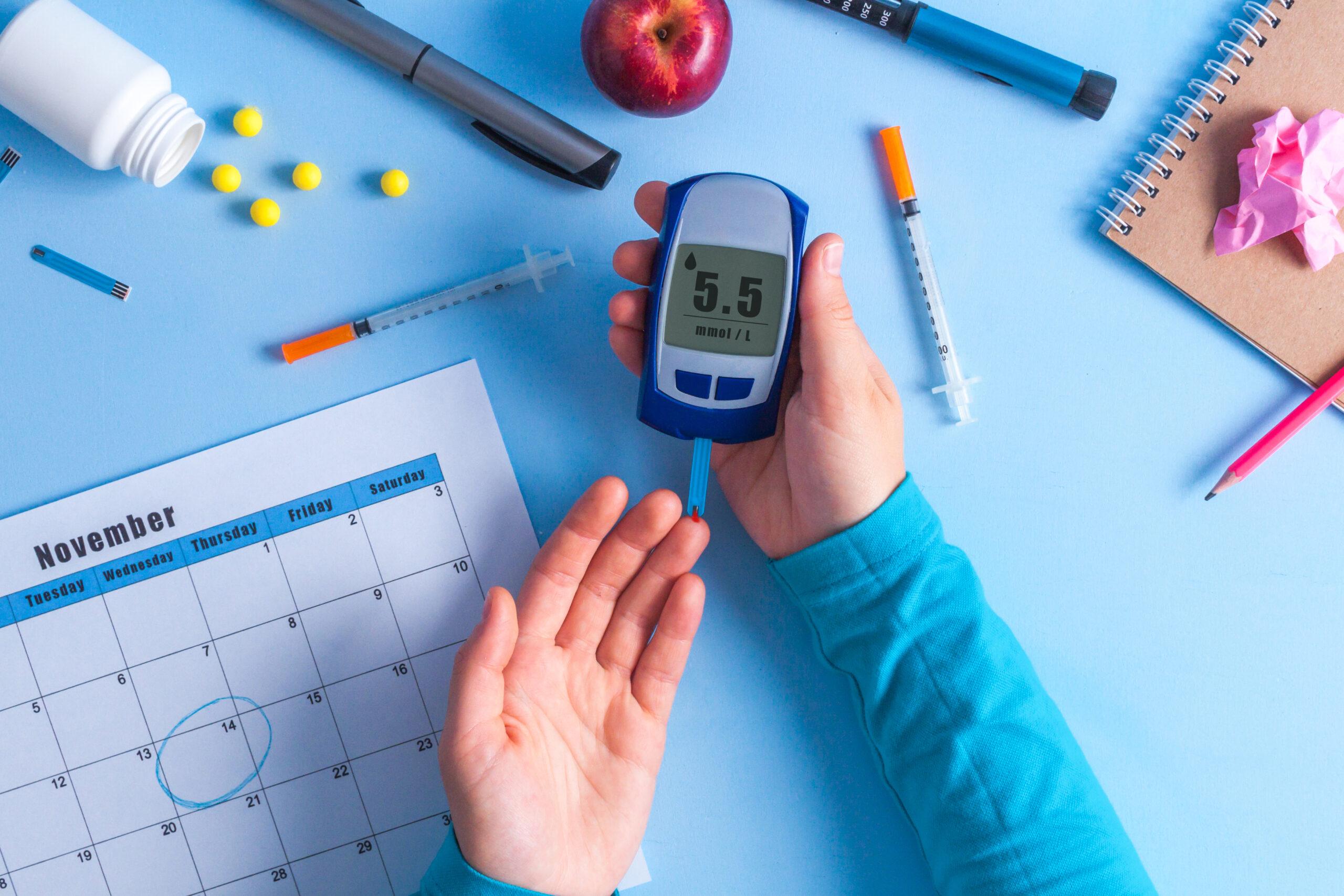
Embarking on exploring diabetes brings us to a lesser-known intersection – the relationship between exhaustion and diabetes. Beyond the hustle and bustle of daily life, persistent fatigue might be a subtle indicator of something more profound: diabetes. This blog endeavours to unravel the intricate connection between feeling constantly drained and the potential presence of diabetes. By navigating the straightforward language of diabetes awareness, we aim to shed light on the signs that tie exhaustion to this condition. This journey into understanding these signals serves as a crucial guide for effectively managing diabetes and fostering overall well-being.
Is Exhaustion a Symptom of Diabetes? Unveiling Diabetes-Related Fatigue
Feeling wiped out is more than just an inconvenience for those with diabetes—it's a common struggle. Reports show that individuals living with both type 1 and type 2 diabetes often face this energy-draining companion. Imagine your body as a smartphone—just like how apps run in the background can drain your battery, managing blood sugar levels constantly runs in the background for diabetics, using up precious energy.
@kidneyhealthmd Join Dr. Irfan in this enlightening video as she unravels the complexities of chronic inflammation in relation to chronic kidney disease (CKD). She delves into the tenets of functional medicine in managing it, discussing the roles of diet, lifestyle, and awareness of triggers. She also sheds light on the importance of personalized planning to address the root causes of kidney disease and ways to improve kidney health, rather than relying on general advice or random supplement intake. If you're keen on starting your journey to better kidney health, this video could be your first step. Visit up.drbismah.com to learn more about a personalized plan for your kidney health. #KidneyHealth #MaximizeKidneyHealth #Inflammation #ChronicKidneyDisease #FunctionalMedicine #HealthyDiet #HealthyLifestyle #DrIrfan #KidneyCare #PersonalizedPlan #HolisticApproach #HolisticHealing #PersonalizedTreatment #NaturalRemedies #KidneyDisease #DrIrfan #Detoxification #md #kidneydoctor #Kidneydiet ♬ original sound - Kidney and Holistic MD
Dealing with high blood sugar is like jogging through molasses; everything feels more complex and slower. This isn't helped because, despite popular belief, spikes or dips in glucose don’t always flag down fatigue directly Lack of correlation between fatigue and hyperglycemia. But when you throw chronic conditions into the mix, such as diabetic neuropathy or depression symptoms—which are no strangers to people battling diabetes—the tiredness becomes even heavier.So, it's clear that lifestyle plays a massive role in our energy levels. Insufficient sleep, like a messed-up bank account, can throw your body out of whack. And if you're not eating right? That could leave you missing key vitamins and feeling wiped out. But the good news is we've got control over these choices—better habits mean more pep in your step. (Impact of Sleep Disruption on Diabetes)
Blood Sugar Fluctuations and Their Impact on Energy Levels
Wondering if Is Exhaustion a Symptom of Diabetes? The rollercoaster of energy levels in diabetes can feel like a constant up-and-down motion. While elevated blood sugar might initially seem like a boost, it can lead to weariness when sustained for too long. Despite the increased urination and resulting dehydration, studies suggest that fatigue symptoms are not directly linked to hyperglycemia or glycemic variability.Picture every cell in your body with its own 'out-of-order' sign due to excess sugar. Even with abundant fuel (high blood glucose), cells struggle to convert it into energy without insulin functioning correctly. People with diabetes may indeed experience extreme fatigue as a prominent symptom. Still, research indicates no straightforward correlation between elevated or fluctuating sugar levels and a constant desire to nap.
Psychological Aspects Contributing to Diabetic Fatigue
Living with is diabetes a disability? It isn't just a physical challenge; it's a mental marathon that can leave you feeling emotionally drained. When your blood sugar is as unpredictable as the stock market, fatigue becomes more than just a nuisance—it’s an unwelcome companion on your journey to health.The psychological factors at play are real and powerful. Mental health takes a hit with every high blood glucose reading, and depression symptoms can sneak up like silent shadows, darkening your mood further. Studies have found that those managing their condition often grapple with depressive disorder alongside other diabetes complications.
The Emotional Toll of Managing Diabetes
Ongoing battles against high blood pressure or dealing with beta blockers add another layer of complexity for someone newly diagnosed type 1 or type 2 diabetic individuals—making them feel overwhelmed by even routine tasks, even not knowing how long can a person live on dialysis. But it's not just about the numbers on your glucometer; emotional distress also rears its head in this mix, intertwining tightly with feelings of extreme fatigue.Your daily dose of insulin might help control glucose levels but doesn’t always offer relief from the weight of chronic fatigue syndrome—a burden shared by many in the American Diabetes community. A strong focus on good sleep hygiene could give some respite from poor sleep patterns, exacerbating tiredness and improving overall well-being and energy levels.
Influential Lifestyle Factors for Fatigue in People with Diabetes
This never-ending race often leads to exhaustion that creeps into every aspect of life. Now, imagine your body as a smartphone—just like apps drain your battery, confident lifestyle choices can sap the energy right out of you.

A healthy diet isn't just about avoiding high blood sugar spikes; it's fuel for keeping your engine humming smoothly throughout the day. Skimp on physical activity, and you might hit 'low power mode' faster than usual. It’s not rocket science: good sleep recharges you overnight so that fatigue doesn’t stand a chance by morning.But here's where things get tricky—the menu of lifestyle choices also includes some less obvious items like emotional distress or poor sleep patterns, akin to background apps draining your energy without even knowing it. Diabetes management is complex, and when uncontrolled diabetes enters the mix, complications skyrocket, including kidney issues—and we all know kidneys are key players in this whole operation.
Diet's Role in Sustaining Energy for Diabetics
If someone told me managing my plate could help control my pep, I'd want specifics, too. So, let’s break down how those leafy greens and lean proteins keep our internal batteries charged longer than sugary snacks ever could. Remember, folks: what goes on your fork has more power over feeling fatigued than most realize.
Effective Strategies for Managing Tiredness
Feeling tired due to diabetes? Know that you're not facing it alone. Addressing this fatigue requires more than just a good night's sleep. It's about managing your energy levels with intelligent strategies and medical insight.Read More: is stage 4 lupus deadly?
Optimizing Medical Treatment Plans
Finding the right balance in your diabetes medications can be like tuning an instrument; it needs to hit just the right note to make music instead of noise. Work closely with your healthcare team because sometimes, tweaking doses or timing can turn things around regarding exhaustion. Remember, uncontrolled diabetes leads to complications, which only drag down energy further.Blood sugar swings are notorious for sapping strength, too. So keeping glucose levels steady is key—this isn't always about hitting low numbers but avoiding those highs and lows that leave you feeling drained. Consider also whether other conditions might be at play here; beta blockers used for high blood pressure could contribute to tiredness, while diabetic neuropathy causes discomfort that disrupts restful sleep.
Lifestyle Adjustments That Help Combat Fatigue
Your daily habits have power—the food on your plate fuels your body like gas powers a car: premium quality means better performance. Aim for meals balanced with complex carbs, protein, and healthy fats; they release energy slowly rather than in short bursts that fizzle fast. Moving more sounds counterintuitive when you’re already exhausted, but hear me out: regular physical activity actually boosts long-term stamina by improving sleep patterns and reducing stress—both villains in our fight against weariness.
Conclusion
So, is exhaustion a symptom of diabetes? Yes, it's clear now that energy dips are more than just feeling tired. They're a sign to take notice of your body's signals. Remember: managing sugar levels is crucial. Remember: emotional well-being impacts your stamina, too. And remember: lifestyle tweaks can make all the difference.You've learned how blood glucose fluctuations can leave you weary and why stable control matters for vitality. You've seen how stress takes its toll and why good sleep counts for so much. Embrace these insights into fatigue as part of living with diabetes. Remember that adjusting habits and treatments can help reclaim your vigour. It's about balance—finding what works uniquely for you—and moving forward with renewed strength each day.
